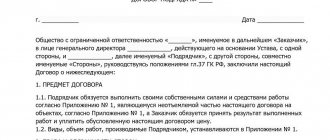Explanations from the Ministry of Construction
On this issue, the Ministry of Construction of the Russian Federation provided clarification in its letter No. 35750-OL/04 dated November 5, 2015, in which it clearly stated that the management company must have a resource supply agreement with RSO, since this is a mandatory licensing requirement and is subject to licensing control (Part 1 of Article 193 of the RF Housing Code).
According to the Decree of the Government of the Russian Federation No. 416 of May 15, 2013 “On the procedure for carrying out activities for the management of apartment buildings”, management of houses is also ensured through the conclusion of contracts for energy supply, heat supply, hot and cold water supply, sewerage, gas supply with RSO for the provision of utility services to the owners of premises in apartment buildings . Accordingly, the conclusion of resource supply agreements is a licensing requirement subject to licensing control .
The Ministry of Construction also draws attention to the fact that agreements between the owners of premises in MKD and RSO, concluded before the entry into force of Federal Law No. 176 of June 29, 2015, are valid until their expiration date or refusal of one of the parties to perform. Only in this single case, the absence of a resource supply agreement between the management company and the RSO cannot be qualified as a violation of licensing requirements.
In Letter of the Ministry of Construction No. 35750-OL/04, Deputy Director of the Housing and Communal Services Department O.A. Leshchenko focuses on paragraph 7, part 1, article 193 of the Housing Code, which states that management companies must comply with “other requirements established by the Government of the Russian Federation.” In addition, in accordance with clause 3 of the Regulations on licensing business activities for the management of apartment buildings, approved by Decree of the Government of the Russian Federation No. 1110 of October 28, 2014, licensing requirements include:
- compliance with the requirements provided for in Part 2.3 of Article 161 of the RF Housing Code;
- fulfillment of obligations under the management agreement provided for in Part 2 of Article 162 of the Housing Code of the Russian Federation;
- compliance with the requirements provided for in Part 1 of Article 193 of the RF Housing Code.
In accordance with Part 2 of Article 162 of the Housing Code of the Russian Federation, under the management agreement, the management company, on the instructions of the owners of premises in the apartment building, within an agreed period for payment, undertakes to carry out work and provide services for managing the apartment building, proper maintenance and repair of common property in the house, and provide utilities , carry out other activities aimed at achieving the goals of managing the house.
To apply Article 162 of the Housing Code of the Russian Federation, Decree of the Government of the Russian Federation No. 416 of May 15, 2013 approved the Rules for the implementation of activities for the management of apartment buildings, which state that, according to paragraph “e”, paragraph 4, house management is ensured, including through the provision of utilities services to the population on the basis of concluded resource supply agreements for the supply of resources. Summarizing all of the above, the conclusion of resource supply agreements between the management company and the RSO is a licensing requirement and falls under licensing control.
Determine the contractor
Decree of the Government of the Russian Federation dated June 29, 2016 No. 603 amended the definition of the concept of “provider of public services” in the resource supply agreement (clause 2 of the Russian Federation Regulations dated February 14, 2012 No. 124). Now it differs from the wording given in RF PP No. 354.
The provider of utility services for the purposes of a resource supply agreement is a legal entity or individual entrepreneur who has an obligation to maintain common property in an apartment building and/or who provides utility services to the consumer in cases where such an obligation is assigned to him by the management agreement of the apartment building or the charter of the HOA/ Housing cooperative.
That is, if the management organization management method is chosen in the MKD or a HOA/housing association is created, then the provider of utilities is the management organization or the HOA/housing association, respectively.
In the case where the HOA has entered into a management agreement with the management organization, under the resource supply agreement, the management organization will be the executor of the utility service, if the management agreement between the HOA and the management organization stipulates its obligation to maintain the common property of the apartment building and/or provide utilities.
The utility service provider applies to the RSO to conclude a resource supply agreement (clause 4 of the RF PP No. 124).
Who provides utilities in disputed houses
86710
Difference between direct contracts and direct payments
As practice has shown, most representatives of the housing and communal services sector, including management companies , do not fully understand the difference between direct contracts that will now be concluded between homeowners and RSOs, and direct payments under the scheme consumer utilities - supplier utilities.
The term “ provider of utility services ”, enshrined in housing legislation, has not yet been abolished by anyone, so management companies continue to be responsible for the quality of the utilities provided and the collection of payments. If there is a management company as the chosen organization for managing the apartment building, it is the management company that acts as the executor of the management. Consequently, the management company must provide utility services to consumers and purchase utility resources for this on the basis of concluded resource supply agreements with RSO.
Oddly enough, many management companies still use gray contractual and settlement schemes. For example, a management company negotiates with RSO on direct billing for utilities to consumers, while it itself deals with settlements, delivery of receipts, claims work, and debt collection. At the same time, the management company has no legal right to engage in such activities at all, since it has nothing to do with public services.
Moreover, often management companies do not have any concluded resource supply agreements with RSO. Then on what basis are utilities supplied to residential buildings and fees are charged? To prevent this from happening in the future, management companies will now be carefully checked for the presence of resource supply agreements with RSO as part of licensing control.
It is necessary to understand that the maximum risk in this case is borne by the management company, which, in addition to the threat of inspection of licensing control, may find itself in a situation where RSO can absolutely legally at any time demand from the management company debts not paid by consumers for the resources supplied to them. In turn, consumers of utilities can also legally demand recalculations from their management company for unprovided utilities or inadequate quality of utility services . But there is also a more serious responsibility for the lack of concluded agreements between the management company and the RSO.
When using this material, reference to the source is required © “Chairman of the HOA”
author: Olga Perminova
published in the magazine “Chairman of the HOA” in No. 12_ 2013
Housing associations (HOA, housing cooperative, TSN), when managing a house, provide utility services to the owners (tenants) and are obliged to provide them directly, that is, purchase the resource from the RSO and transfer (without selling) the owners (tenants). Homeowners' associations, housing cooperatives, and TSN extremely rarely come to mutual agreement with the RSO when concluding an agreement.
According to the general rule provided for in Art. 421 of the Civil Code of the Russian Federation, citizens and legal entities are free to enter into an agreement. According to paragraph 1 of Art. 445 of the Civil Code of the Russian Federation in cases where, in accordance with the law, the conclusion of an agreement is mandatory for the party to whom the offer (draft agreement) is sent, this party must send the other party a notice of acceptance, or of refusal to accept, or of acceptance of the offer on other terms ( protocol of disagreements to the draft agreement) within 30 days from the date of receipt of the offer.
Offer in accordance with Art. 435 of the Civil Code of the Russian Federation recognizes an offer addressed to one or more specific persons, which expresses the intention of the person who made the offer to consider himself to have entered into an agreement with the addressee who will accept the offer. The offer must contain the essential terms of the contract. It binds the person who sent it from the moment it is received by the addressee. Acceptance in accordance with Art. 438 of the Civil Code of the Russian Federation recognizes the response of the person to whom the offer is addressed regarding its acceptance. Acceptance must be complete and unconditional. Silence is not acceptance unless otherwise provided by law, business customs or previous business relations of the parties. Acceptance of an offer on other terms (Article 443 of the Civil Code of the Russian Federation) is a response indicating consent to conclude an agreement on terms other than those proposed in the offer. It is not an acceptance, but is recognized as a refusal of acceptance and at the same time a new offer. An offer received by the addressee cannot be withdrawn within the period provided for its acceptance, unless otherwise specified in the offer itself or follows from the essence of the offer or the situation in which it was made (Article 436 of the Civil Code of the Russian Federation). At the same time, if the notice of revocation of the offer was received earlier or simultaneously with the offer itself, it is considered not received (Clause 2 of Article 435 of the Civil Code of the Russian Federation). The same procedure applies to acceptance: if a notice of revocation of acceptance was received by the person who sent the offer earlier than the acceptance or simultaneously with it, the acceptance is considered not received (Article 439 of the Civil Code of the Russian Federation).
The Ministry of Construction explains: without an agreement with RSO, the management company is not a provider of utility services!
In Letter dated December 30, 2016 No. 45097-ACh/04
, signed by the Deputy Minister of Construction and Housing and Communal Services of the Russian Federation, the point of view of officials on the procedure for providing utilities to the population by resource supply organizations is set out in great detail, provided that the house is managed by a management company (HOA, cooperative).
The main postulate on which the reasoning is based is that in the absence of resource supply agreements concluded with RSO, management companies (HOA, cooperative) cannot perform the functions of a provider of utility services; RSO provide utilities if the house is managed by a management company (HOA, cooperative), in cases where contracts resource supplies between the building managers and the RSO have not been concluded or have been terminated.
The letter made the following conclusions:
– from June 30, 2016, RSO has the right to unilaterally refuse to fulfill the contract with the manager of the apartment building if the conditions from paragraphs are met. “a” clause 30 of the Rules for concluding resource supply agreements
, even if such a right is not specified in the contract itself;
– under agreements between consumers and RSOs concluded (including through the performance of conclusive actions by consumers) as of June 30, 2015 (which are discussed in Part 17 of Article 12 of the Federal Law of June 29, 2015 No. 176-FZ
), refers to agreements concluded, including in cases where, during the management of the house of a management company (HOA, cooperative), a resource supply agreement was not concluded or was terminated (
clauses 6 – 9, 14, 15, 17 of
the Rules for the provision of utility services);
– the rule that the owners of premises pay for utilities to the Criminal Code ( part 7 of article 155 of the Housing Code of the Russian Federation
), apply to cases where the management company has concluded resource supply agreements in the prescribed manner with the relevant RSO for the purpose of providing utility services, and do not apply in cases where the provider of utilities is the RSO;
– since housing legislation allows for the absence of a resource supply agreement concluded between the management company and the RSO, the provision of utility services of inadequate quality can be considered as a violation by the management company of the established licensing requirements only in the case where a resource supply agreement has been concluded between the management company and the RSO.
We strongly recommend that you familiarize yourself with the contents of the explanation from representatives of the Ministry of Construction. Perhaps this letter will help managers of apartment buildings in court proceedings or in the pre-trial resolution of disagreements with the bodies of the Civil Housing Authority. However, we must not forget that currently in judicial practice the prevailing approach is that the management company is by default the provider of public services; in the absence of a written resource supply agreement, actual contractual relations are formed between the management company and the RSO.
For more details, see the consultations: – “The manager does not have an agreement with the RSO: who is the executor of the management company?”
;
– “Direct contracts, payment for utilities on one-way street: amendments from 06/30/2016”
;
– “Direct contracts: the owner forced the RSO to comply with the obligations of the performer”
;
– “The Supreme Court checked the legality of clauses 14, 17, 18 of the Rules for the provision of public services”
;
– “Manager of an apartment building and non-contractual consumption of a communal resource are incompatible concepts”
;
– “The management company is obliged to pay RSO for excess consumption at ODN, even if a resource supply agreement was not concluded”
;
– “The order of the Criminal Code to conclude an agreement with the RSO is legal!”
.
Lack of agreement between resource supply and management organizations, problems and solutions
This scientific study examines the problem of the lack of a concluded resource supply agreement between the management company and the resource supply organization, as well as the possible consequences for these housing and communal services enterprises. The presented scientific article suggests ways to solve the above problem by amending the current legislation of the Russian Federation.
Key words: resource supplying organization, management company, resource supply agreement, apartment building, utilities, consumers of utility services, rules for the provision of utility services, Housing Code of the Russian Federation.
This scientific study addresses the problem of the absence of a concluded resource supply agreement between the management company and the resource-supplying organization, as well as the possible consequences for these enterprises of the housing and utilities sector. In the presented scientific article proposed ways to solve the above problem by amending the current legislation of the Russian Federation.
Keywords: resource supplying organization, management company, resource supply agreement, apartment building, utilities, utility consumers, utilities provision rules, Housing Code of the Russian Federation.
It’s no secret that legislation in the housing and communal services sector is of great importance both for the state, the huge bureaucratic machine, and for ordinary citizens. At the same time, the comfortable functioning of legal entities in this area raises many questions, one of which we will consider in this scientific article is the legal consequences of the absence of a contract for the supply of resources.
One of the fundamental documents regulating activities are the Rules for the provision of utility services to owners and users of premises in apartment buildings and residential buildings" [1] (hereinafter referred to as Rules No. 354), which, despite their regulation, have certain problems when considering legal disputes, to for example, disputes regarding the collection of fees from management companies, partnerships and cooperatives for utility resources supplied to apartment buildings (hereinafter referred to as MKD) in the absence of a written resource supply agreement. These problems are due, as we see it, to the fact that the legislator has rather vaguely spelled out the issue of determining the proper provider of utility services and, as a consequence, the validity of debt collection from a particular person. The headache in this situation is those unscrupulous legal entities that do not show any desire to enter into energy supply agreements with resource supply organizations.
After the entry into force of Rule No. 354, two main approaches to resolving emerging disputes emerged in judicial practice.
According to the first approach, the organization (regardless of its organizational and legal form permitted by housing legislation) that manages the MKD fund is automatically the executor of utilities and thus has the responsibility to pay for utilities.
According to the second, the absence of a concluded resource supply agreement assumes that utilities are provided by the directed resource supplying organization, in which case the management company is not the contractor and is not obliged to pay the corresponding bills [2].
The difficulty of correct interpretation arises due to the wording of clauses 14, 15 of Rules No. 354. In accordance with these Rules, in order to carry out the functions of managing an apartment building, a management company is elected in accordance with the procedure established by the housing legislation of the Russian Federation, which begins to provide utility resources to residents of apartment buildings from the date established by the decision general meeting of owners of premises in an apartment building on the selection of a management company or, accordingly, from the date of concluding a management agreement for an apartment building, including with a management company elected by local authorities based on the results of an open competition, but not earlier than the start date for the provision of services under a resource supply agreement .
It should be noted that the resource supply agreement comes into force from the date of signing by both parties to the agreement (clause 15 “On the rules mandatory when concluding contracts for the supply of utility resources” (hereinafter referred to as Rules No. 124) [3].
In this regard, according to Art. 161 of the Housing Code of the Russian Federation [4] (hereinafter referred to as the Housing Code of the Russian Federation), in the absence of a concluded resource supply agreement between the resource supply organization and the enterprise chosen as the provider of utility services to residents of apartment buildings, the latter does not have the right to begin providing utility resources and is not responsible, established by housing legislation and the management agreement for an apartment building, which means it loses its status as a provider of utility services. It follows from this that the specified provisions of the above-mentioned Rules No. 354 contradict the housing legislation of the Russian Federation, namely clause 7 of Art. 155, paragraph 2, 3, 12 art. 161ZhK RF [5].
In practice, there is an opinion: in the absence of a concluded resource supply agreement with an energy-saving organization, the management company does not have the right to receive funds from consumers of an apartment building under their management.
There is a position of the courts according to which, in the absence of a resource supply agreement, Rules No. 124 do not provide for the possibility of the management company providing utility resources to residents of apartment buildings. In this case, the actions of a resource supplying organization that directly provides utility services to consumers - owners and users of apartment buildings and issues invoices for payment for these services will not be considered as contrary to the legislation of the Russian Federation. [6] Based on the foregoing, we can conclude that the absence of a concluded resource supply agreement entails the following consequences for the utility provider (management company):
‒ the management company loses the opportunity to be a provider of public services;
‒ does not have the opportunity to collect funds from the population (consumers of services) and further transfer them to the resource supplying organization;
However, we believe that this position looks at least controversial from a practical point of view.
If we assume that the residents of apartment buildings have shown their will and chosen a management company to manage the house, then accordingly they entrust it with the responsibility for comprehensive maintenance of the house, which includes the supply of energy resources. It is clear that there must be an agreement for the supply of energy resources and this is not in doubt, but the straightforward position according to which there is no agreement - no management of the house is just as vicious. The sphere of housing and communal services is too important for such crude conclusions.
I consider the position of the courts to be more adequate and applicable, according to which the contract must be concluded from the moment of the actual provision of resources.
Thus, the Supreme Court came to the conclusion that paragraph 14 of Rules No. 354 for the provision of public services is based on the special provisions of Part 12 of Art. 161ZhK RF, is consistent with the system of normative provisions that are in an obvious relationship and cannot be regarded as violating the procedure for managing the management organization established by the decision of the general meeting [7]. Clause 8 of Rules No. 354 for the provision of utility services specifies these legal norms: the provider of utility services can be either a management company or a resource supply organization, and the period of time during which the relevant person is obliged to provide utility services to consumers and has the right to demand from them payment for the provided them utility services, subject to determination in accordance with clauses 14, 15, 16 and 17 of Rules No. 354 for the provision of utility services. In turn, according to paragraphs. “b” clause 17 of the same document, the resource supplying organization begins to provide utility services to the owners of premises in an apartment building in which the management method has been chosen, but the events specified in clauses 14 and 15 of the new Rules for the provision of utility services have not occurred from the date of occurrence ownership rights to premises. At the same time, from the date of commencement of the provision of utility services by the contractor, indicated in clauses 14, 15, 16 and 17, an agreement containing provisions for the provision of utility services (clause 10 of these Rules) is considered concluded through the completion of conclusive actions by the consumer [8].
A somewhat similar position was reflected in the information letter of the Supreme Arbitration Court of the Russian Federation. According to clause 2 of the said act [9], if the consumer refuses to conclude an agreement, but actually uses the services (energy supply, communication services, etc.) provided by the obligated party, in this case the actual use of the resources is regarded as the subscriber’s acceptance of the offer offered the party supplying the relevant services (clause 3 of Article 438 of the Civil Code of the Russian Federation) [10], therefore, such relationships are considered contractual. In addition, the current legislation provides that organizations performing the functions of managing apartment buildings are responsible for the supply of resources to residents of apartment buildings and do not have the right to refuse to enter into resource supply agreements (Article 161 of the Housing Code of the Russian Federation).
So what is the best way to solve this problem? In our opinion, the ideal option would be to amend the current legislation of the Russian Federation, namely Rule No. 354, according to which, if residents and owners of premises in an apartment building choose a management method using the funds of a management company or HOA, then such organizations, after 3 months from the date of the general meeting of residents, an agreement must automatically be concluded with the resource supplying organization, if during this time they have not provided the resource supplier with an application to refuse delivery and documents confirming the possibility of supplying resources to consumers - individuals in an alternative way.
Literature:
- Decree of the Government of the Russian Federation of May 6, 2011 No. 354 “On the provision of utility services to owners and users of premises in apartment buildings and residential buildings” // SPS “Consultant Plus”. 2021.
- Maksimova N. N. Questions and answers // Housing and communal services: accounting and taxation. 2013. No. 7. pp. 19–21; Kozyreva S.N. Provider of utility services - without an agreement with the RSO? // Housing and communal services: accounting and taxation. 2014. No. 3. pp. 46–51.
- Decree of the Government of the Russian Federation of February 14, 2012 No. 124 (as amended on June 1, 2017) “On the rules required when concluding contracts for the supply of utility resources for the purposes of providing utilities. 2021.
- Housing Code of the Russian Federation dated December 29, 2004 No. 188-FZ // SPS “Consultant Plus”. 2014.
- Razin R. A. Practice of concluding a resource supply agreement // Lawyer. 2015. N 5. pp. 30–35.
- Resolution of the Federal Antimonopoly Service of the North-Western District of November 20, 2013 in case No. A26–536/2013; Resolution of the Federal Antimonopoly Service of the Volga Region dated May 6, 2014 on case No. A12–19023/2013 // ATP “Consultant Plus”. 2017.
- Decision of the Supreme Court of the Russian Federation dated January 13, 2014 No. AKPI13–1116 On the refusal to recognize partially invalid paragraph 14 of the Rules for the provision of utility services to owners and users of premises in apartment buildings and residential buildings, approved by Decree of the Government of the Russian Federation dated May 6, 2011 No. 354 // SPS “Consultant Plus”. 2021.
- Kozyreva S.N. Provider of utility services - without an agreement with RSO? // Housing and communal services: accounting and taxation. 2014. No. 3. pp. 46–51.
- Information letter of the Presidium of the Supreme Arbitration Court of the Russian Federation dated May 5, 1997 No. 14 “Review of the practice of resolving disputes related to the conclusion, amendment and termination of contracts” // ATP “Consultant Plus”. 2017.
- Civil Code of the Russian Federation (part one) dated November 30, 1994 No. 51-FZ (as amended and supplemented, entered into force on July 1, 2014) // SPS “Consultant Plus”. 2021.
Can an apartment owner independently refuse the mediation services of a management company?
No, one person cannot enter into a direct agreement with RSO. Such a decision must be made at a general meeting of owners of premises in an apartment building. To switch to direct contracts, the consent of the owners of at least half of the property in the house is required.
When such a decision is made, residents must bring a copy of it and a copy of the minutes of the owners’ meeting to the RSO. There is no need to sign the contract - it will be concluded automatically after submitting the documents.
New norms and positions of courts
In accordance with paragraph 3 of clause 6 of the Rules for the provision of utility services to owners and users of premises in apartment buildings and residential buildings, approved by Decree of the Government of the Russian Federation of May 6, 2011 No. 354 (hereinafter referred to as Rules 354) as amended, effective from 01.01.2017, supply cold water, hot water, thermal energy, electrical energy and gas to non-residential premises in an apartment building (MKD), as well as wastewater disposal are carried out on the basis of resource supply agreements concluded in writing directly with the resource supplying organization .
It would seem that everything is clear - from January 1, 2021, RSOs must provide utility services in non-residential premises, and management companies/homeowners' associations/housing cooperatives, accordingly, lose the right to provide such services from the same date. However, it is necessary to pay attention to several nuances.
Paragraph 4 of clause 6 of Rules 354 imposes on management organizations, homeowners' associations, housing cooperatives the obligation to notify the owners of non-residential premises about the need to conclude an agreement directly with the RSO, and to send information about the owners of non-residential premises to the RSO. It is important to note that the period for sending such a notification is not regulated; accordingly, holding the management organization accountable for failure to send or untimely sending will be quite difficult, and most likely impossible. However, it is precisely the failure of the management company/homeowners association/housing association to fulfill this obligation that can be accepted by the courts as a basis for recognizing as valid the contract for the provision of utility services concluded specifically between the management organization/homeowners association/housing association and the owner of non-residential premises in the apartment building, and, accordingly, recognizing the fact that there is no legal relationship between this owner and RSO.
Thus, in the Resolution of the Thirteenth Arbitration Court of Appeal dated March 5, 2021 No. 13AP-33733/2017 in case No. A56-55921/2017, a claim for debt collection under a heat supply agreement was considered, since the homeowners’ association had not fulfilled its obligations to timely pay for the supplied heat energy . The essence of the dispute was that the HOA did not make payments under the heat supply agreement regarding non-residential premises. The partnership referred to paragraph 6 of Rule 354, but did not send a notice to the owners, did not provide information to the RSO, and did not make any other changes to the agreement regarding non-residential premises. The court collected the resulting debt; the appeal ruling declared the decision of the first instance court to be justified and not subject to change.
In the Resolution of the Arbitration Court of the Volga-Vyatka District dated March 5, 2021 No. F01-6032/2017 in case No. A28-3497/2017, the court indicated that “ the absence of a direct agreement between the owner of non-residential premises and the resource supply organization during the disputed period does not relieve the management company from the obligation to pay the utility resource supplied to apartment buildings in full .” Additionally, the court about. The court also took into account that “since Resolution No. 1498 does not contain any rules regarding the timing of concluding agreements between the owners of non-residential premises in MKD and resource supply organizations in writing, and also does not establish the timing of the transfer by management organizations of information about the owners of non-residential premises in the RNO, Until the termination of the contract for the provision of utility services concluded with the management company, the owner of non-residential premises may pay a fee to the management company .”
According to the position of the court, set out in the Resolution of the Thirteenth Arbitration Court of Appeal dated March 5, 2021 No. 13AP-766/2018 in case No. A56-73290/2017, the management organization is obliged to take measures aimed at concluding separate resource supply agreements with resource supply organizations , which include, in particular, the sending of notifications and information provided for in paragraph 6 of Rules 354. The specified list of activities established by paragraph 6 of Rules 354 is exhaustive, specific and must be carried out by the Company as a provider of public services in apartment buildings managed by the applicant . In the said Resolution No. 13AP-766/2018 o. Notification to the owner of non-residential premises must be individual in nature and cannot be intended for an indefinite number of persons. Additional posting of this information on the website or in public places of the MKD will not constitute a violation, but has no legal significance.








